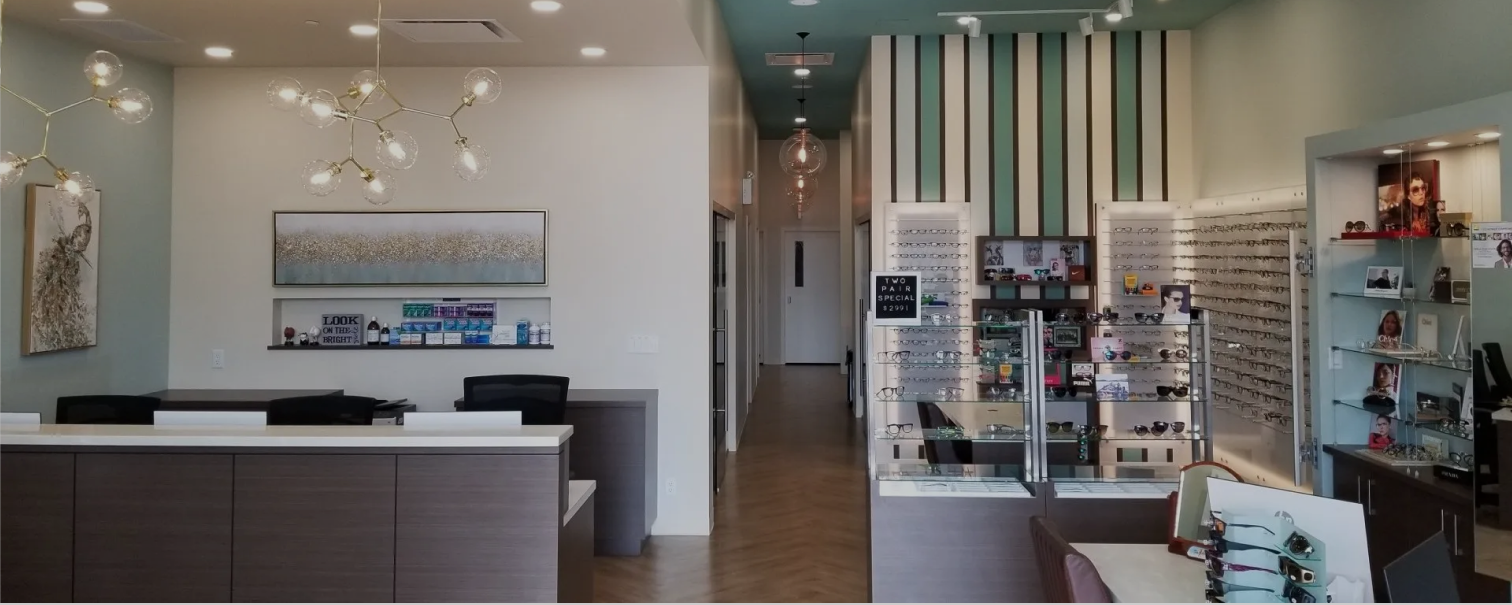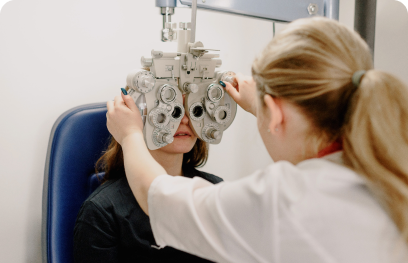Our Promise
At Optiko, we believe that your eyes are the windows to your soul. That’s why we take such pride in helping you see the world around you in all its beauty.
Optiko is committed to providing you with high-quality vision care in Calgary. Whether it’s a simple eye exam or finding the perfect pair of frames to fit your face, we’re here to help you with everything. We want to make sure that every visit to our shop is an enjoyable one – that’s why we’ve designed our practice around making sure patients are comfortable from the moment they walk in until they leave.

Our Promise
At Optiko, we believe that your eyes are the windows to your soul. That’s why we take such pride in helping you see the world around you in all its beauty.
We’re committed to providing you with the best possible eye care that you can find in Calgary. Whether it’s a simple eye exam or finding the perfect pair of frames that will fit your face perfectly, we’re here to help you with everything. We want to make sure that every visit to our shop is an enjoyable one – that’s why we’ve designed our practice around making sure patients are comfortable from the moment they walk in until they leave.
Eye Exams for Seniors in Calgary
At Optiko, we’re committed to providing our senior citizens with thorough and high-quality eye case. We want you to get the most out of your vision, and we’re here to help you do just that.
Our two locations in Market Mall and Sunridge Mall make it easy for you to come in to your local Calgary eye clinic and get a comprehensive eye exam from one of our expert optometrists. We can also help you find the perfect pair of glasses or contacts based on your needs, and we’ll even offer tips on how to care for them properly so they last as long as possible. Seniors’ eye exams are partially covered by Alberta Health Care, and at Optiko, we include Optomap ultra-widefield retinal imaging with every comprehensive exam!
We know that getting older can be hard on your eyesight, so we make sure that all of our experts are up-to-date on the latest developments in ocular technology and vision research. Our friendly staff are always ready to answer any questions or concerns you may have about your eye health.
What Aging Means for Your Eyes
As you age, your eyes change. While this doesn’t mean that you need to stop your favourite hobbies or activities, it does mean that you should become more aware of the common age-related changes that can affect your vision. Age-related changes in your eyes include:
Decline in Colour Vision
As we get older, the lenses of the eye tend to yellow, making it appear as if you are looking through a yellow filter. This can make it difficult to distinguish between blue and purple and yellow from green. Cataract surgery can help address this issue. Plus, as we age, the cells of the retina that help us see colour gradually lose their sensitivity, making colours less vivid and harder to distinguish.
Dry Eyes
Our eyes produce fewer mucous cells and tears as we age. This contributes to dry eyes, especially in older women. Eye drops can help alleviate this problem.
Decline in Depth Perception
As people age, their depth perception—the ability to perceive the distance between objects—declines for various reasons, including weakening muscles around the eyes or reduced acuity in one or both eyes from cataracts or age-related macular degeneration. This can increase a person’s risk of falling.
Visual Floaters
You may notice spots or shadows moving across your field of vision as you get older. These are called floaters. Floaters are actually shadows cast by small spots of condensation in the material of your eye called the vitreous gel. With age, your vitreous gel liquefies causing the tiny spots we see as floaters. Floaters are not a cause for concern unless you begin seeing a sudden increase in floaters, red floaters, floaters accompanied by flashing lights, or part of your vision becomes dark, in which case you should seek immediate medical evaluation.
Lenses Become Increasingly Rigid
Presbyopia/farsightedness
As your lenses lose flexibility, it becomes harder to focus on nearby objects and you may notice a decline in your ability to see up close. Reading glasses or bifocal lenses can help.
Difficulty seeing in dim light
As you age, the lenses in your eyes become denser, which reduces the amount of light that gets through to your eyes. This can make it harder for you to see in dim light than when you were younger.
Takes More Time to Adjust to Changing Light Levels
As you get older, your pupils shrink and the muscles that control them weaken. You may need more time to adjust to changing light levels; you may have more trouble going from a bright room to a dark one.
Decline in Peripheral Vision
Our peripheral (side) vision gets smaller as we age, with the size of our visual field decreasing by 1 to 3 degrees per decade.
As you get older, these changes are normal. However, they can also increase your risk of vision problems. The Canadian Association of Optometrists recommends seniors have annual eye exams to ensure their eyes are healthy and properly functioning. If you’re over 65, Alberta Health Care covers the cost of your annual eye exam.
Aging and Eye Conditions: What You Need to Know
As we get older, our eyes start to show signs of wear and tear and are at a greater risk of developing a wide range of eye conditions. That’s why seniors require more frequent comprehensive eye exams and checkups to keep their vision healthy.
Most conditions can be treated, but only if they’re caught early. Left untreated, some eye conditions can put your sight and health in serious jeopardy. We’ve listed some of the most common conditions below and provided a quick summary of each one.
Age-Related Macular Degeneration
Age-related macular degeneration (AMD) is a disease of the retina, which is located at the back of the eye. The retina is made up of light-sensitive cells that allow us to see images. The macula is a part of the retina that is responsible for our central vision and helps us see fine details clearly, such as faces and other objects. When this eye disease occurs, it causes damage to this area of the eye and can lead to vision loss.
AMD usually develops slowly over time. While some people may not notice any changes in their vision at first, others may experience blurred vision or difficulty reading. In some cases, AMD progresses rapidly and can cause severe vision loss within months or years.
Diabetic Retinopathy
Diabetic retinopathy is an eye disease that can occur in people with diabetes. When you have diabetes, your body can’t use the sugar floating around in your blood properly. This leads to high levels of blood sugar (hyperglycemia), which can cause damage to the tiny blood vessels in your retina leading to vision loss and blindness. Diabetic retinopathy is a progressive condition and its symptoms develop slowly over time. Early detection is critical to preventing permanent vision loss.
Glaucoma
Glaucoma is a disease in which pressure builds up in the eye, causing damage to the optic nerve. The optic nerve is the pathway that transfers visual information from the eye to the brain. When this nerve is damaged, it can lead to irreversible blindness. Most forms of glaucoma are painless and without regular eyes exams, you may not notice you have it until you begin experiencing vision loss.
Cataracts
Cataracts are a clouding of the eye’s natural lens. This occurs when the lens becomes progressively more opaque, distorting vision. Cataracts can develop slowly and painlessly and are a common consequence of aging, but if they progress to a severe stage, they can cause significant vision impairment or even blindness. Cataracts can often be removed with surgery.
All Services







